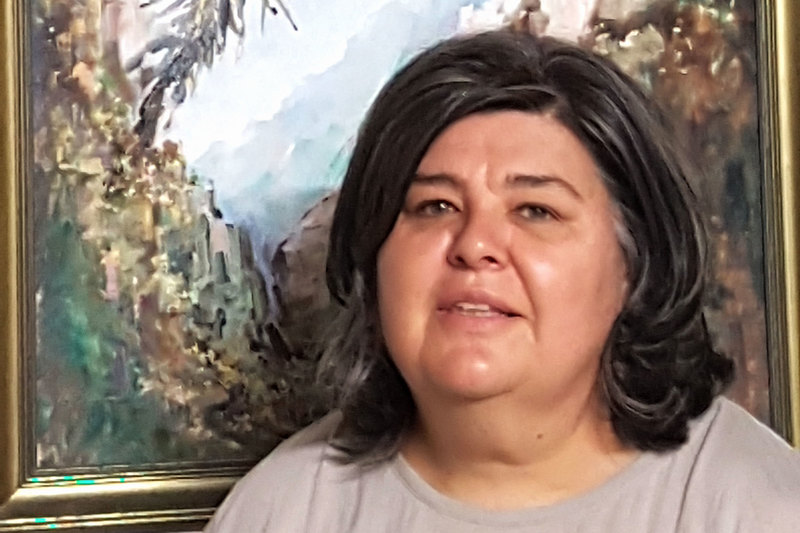‘By day five I could barely breathe’
07 September 2020 | Story Helen Swingler. Photo Supplied. Read time 6 min.
In the past six months, the University of Cape Town (UCT) community has been affected and shaped by COVID-19 in many ways. Some of our closest colleagues and students have died from the virus; others have survived, braving isolation and often lingering symptoms on their journey to wellness. We are deeply grateful to those who have chosen to share their stories of recovery. We hope these will encourage others – and provide hope.
When Dianne Steele, a UCT librarian for the past 16 years, began to feel unwell, she didn’t associate her symptoms with COVID-19. She had been living in isolation after lockdown, but a food delivery may have been the ‘Trojan horse’.
She shared her experiences of illness and recovery with UCT News.
Helen Swingler (HS): When did COVID-19 come to your attention as a real threat worldwide?
Dianne Steele (DS): I first learned about COVID-19 in January 2020. I knew without a doubt that COVID-19 would spread to the rest of the world as we had similar infections in the past, such as SARS [severe acute respiratory syndrome].
“I also want to thank UCT for taking action to protect staff and students against the pandemic.”
HS: How did the rise of the pandemic in South Africa and the precautions UCT took in the face of lockdown affect your work and place of work?
DS: First, I am deeply saddened by the fact that UCT colleagues have passed as a result of COVID-19. Second, I thank my manager, Amina Adam, and UCT Libraries management and Human Resources for their support. I also want to thank UCT for taking action to protect staff and students against the pandemic, in line with the government’s lockdown guidelines. Interestingly, the last couple of days before closing we had already taken precautionary measures, asking students and staff at the Built Environment Library to open their own books when we scanned the loans to them. We also didn’t shelve the books for at least three days when they were returned. We loosely based this decision on initial guidelines published on COVID-19-related international library practices.
HS: When did you start to feel unwell, and did you immediately associate your symptoms with COVID-19?
DS: I had a slight cold, but never associated it with COVID-19. I don’t know how I got COVID-19, but assume I was in contact with a person who delivered food as I was in isolation at that time.
HS: When were you diagnosed and what were your main symptoms? People seem to experience the virus very differently.
DS: I went to the doctor on the Thursday after I began [feeling] unwell and had my results within two days (on the Saturday). During the first four days I only had a cold, but by day five I could barely breathe and I knew that it had affected my lungs.
HS: What were your immediate feelings, given the worldwide attention to the pandemic and the many stories flooding the media?
DS: I was the third person in the family to get it [although the infections were unrelated] and I was supported by my family members who contracted it before me. I was in isolation for 14 days. I started feeling better from day 11, but the coughing lingered for about two weeks after my recovery.
HS: How did you find UCT’s support during this time?
DS: My manager, UCT Libraries and Blanche Claasen-Hoskins from Human Resources were very supportive. I received about five phone calls from Blanche and she was always positive and helpful. I thank UCT for their role in my recovery. Between [Human Resources], my manager and my doctor, I did not really need to make use of UCT’s COVID-19 services. Discovery Health was also helpful in offering advice … I received three phone calls from their advisers.
“I thank all my colleagues at the Built Environment Library and other UCT Libraries staff for carrying my workload during this time.”
HS: Have you been able to resume work?
DS: I lost about 16 days during a huge project at UCT Libraries. I am trying very hard to catch up [on] the lost time. I thank all my colleagues at the Built Environment Library and other UCT Libraries staff for carrying my workload during this time.
HS: What advice can you give to those who become infected?
DS: I took a holistic approach, following the advice from my doctor and recommendations given to me by an [intensive care unit] sister. I took normal cold medications. I drank lots of water and rooibos tea and ate guavas, grapefruit and other vitamin C-rich foods. Most importantly: sit in the sun as much as you can. Do lung exercises (there are good videos available on YouTube). The simplest one involves blowing into a glass of water through a glass straw.
HS: In hindsight, is there anything you wish you’d known?
DS: I wish I’d known that common cold symptoms can be COVID-19. Also, that individuals should immediately go into isolation if they [experience] any cold or influenza symptoms. This is to protect vulnerable people around them.
 This work is licensed under a Creative Commons Attribution-NoDerivatives 4.0 International License.
This work is licensed under a Creative Commons Attribution-NoDerivatives 4.0 International License.
Please view the republishing articles page for more information.
Related










